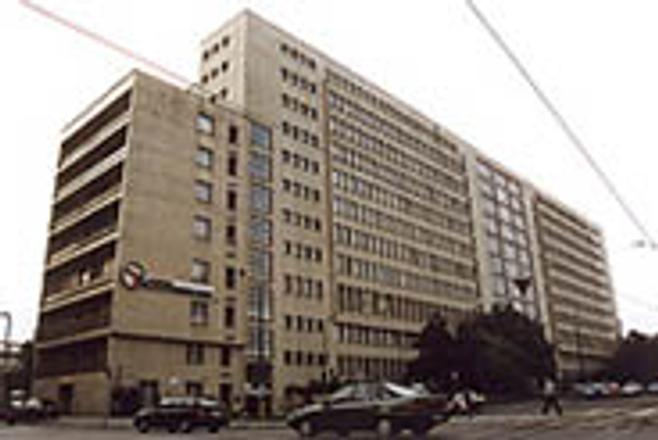Slovenské telekomunikácie (pictured above) was slapped with a 10 million crown fine for abusing its monopoly status. ST will appeal the decision.photo: Martin Janoško
Telecoms monopoly Slovenské Telekomunikácie (Slovak Telecom - ST) has been punished by the Anti-Monopoly Office (PMÚ) for the second time in the last 18 months for "abusing their dominant position on the market".
The ruling came after the Association of Private Internet Providers (API) filed a complaint with the office against ST for installing a "frequency filter" limiting data transfers for Internet access on the fixed line used by the Slovak Agriculture University in Nitra.
PMÚ director Imrich Cvíp told The Slovak Spectator that his office had ruled in favour of the API and had levied a 10 million Slovak crown ($200,000) fine against ST for abusing their monopoly status.
ST spokesperson Gabriela Nemkyová said that the telecoms firm disagreed with the decision and would file an appeal within the 15 day period they are allowed. Until that time, she said, ST would not comment on the ruling.
Internet providers, meanwhile, said that the decision had been just. "We expected this decision," said Márián Durkovič, a member of API's board of directors. "ST broke the law in a gross way and while they have the right to appeal, I don't believe the decision will be reversed."
Dag Ole Storrosten, managing director of Nextra Internet service provider, said that the decision to punish ST was key for the development of a fair telecoms market in Slovakia, and added that the PMÚ had proven to investors that it would not allow ST to continue bullying local competitors.
ST, which shares its Bratislava headquarters with the Telecoms Ministry, was fined for price discrimination.photo: Martin Janoško
"The decision is a very healthy signal for foreign investors," Storrosten said. "They [the PMÚ] let ST know that they have to start acting responsibly, and 10 million crowns is a large enough fine to deliver that message."
"ST has had all the power," he continued. "In the old days, there was no anti-monopoly office and now ST is testing them [the PMÚ] and are having to learn how to operate in an [open] market with a regulatory body. This shows that the PMÚ is working and it's a good sign for investors because they can see that the anti-monopoly office is doing its best to create a fair market."
The ruling
According to the PMÚ's Cvíp, the ruling against ST involved three parts. First, it said that ST was guilty of price discrimination by offering digital networks to Internet their customers at prices 30% lower than the rates which customers of private providers had to pay.
"The prices were not balanced," Cvíp said. "They offered different rates to the users giving preferential prices to their own customers. ST is the owner of all fixed lines so they can provide cheaper services while the API cannot provide such services because they have to go through ST."
The second violation occurred when ST in May began forcing private providers to offer ST's services to users. By doing so, the responsibility of handling the invoices - and the risk of covering subscriber non-payments - fell on the private providers, even though they were ST's services and the private providers stood to gain no profit. With the money from the services going to ST, the private ISPs were put in the role of a middleman, but received no financial compensation.
The final violation, Cvíp said, had been the installment of the frequency filter on the Agriculture University's line, a move the API's Durkovič called "the last straw".
Before installing the filters, ST had warned customers using analogue lines for Internet connections (at 2,000 crowns per month) that they were required to subscribe to ST's Analogue Plus "service" (for 6,500 crowns per month) to continue their Internet connections.
Customers who didn't subscribe would then have the filter installed on their line, restricting the amount of data which could be transferred and effectively cutting the Internet connections to 1% of their normal capacity.
"We sent out letters to our customers many months ago," Nemkyová said in September when the API filed their complaint. "If we received no reply, we had no choice [but to install the filter]."
The API's Durkovič said the filters were illegal. "ST was not authorised to prevent the operation of the lines because they had been operating without problem before the filters were installed," he said. "The filter was not a service, it was just a device to make already functioning lines more expensive."
The PMÚ's Cvíp said that ST had already been under investigation for other law violations, but that the Analogue Plus filters had forced his office into action. "The filters just made the situation worse," he said. "They were already in trouble for offering different prices [to different customers], but this just made it all worse."
While ST is appealling the anti-monopoly office's ruling, the frequency filters will remain installed. If the appeal is rejected, ST will have to remove the filters 30 days after the PMÚ issues its final decision.
Cvíp said that an appeal was not likely to sway his office's decision. Being the second time the PMÚ has had to reprimand ST in the last year and a half - the telecoms firm also lost a decision in 1999 for their Internet access service OnLine Start - Cvíp said that he felt ST needed to be taught a lesson.
"This is the second time," he said. "And because we've had to reprimand them twice, it seems to me as if the latest acts were a provocation. They abused their dominant position on the market and they broke the law on the protection of economic competition. ST is just hurting itself."
Additional reporting by Zuzana Habšudová


